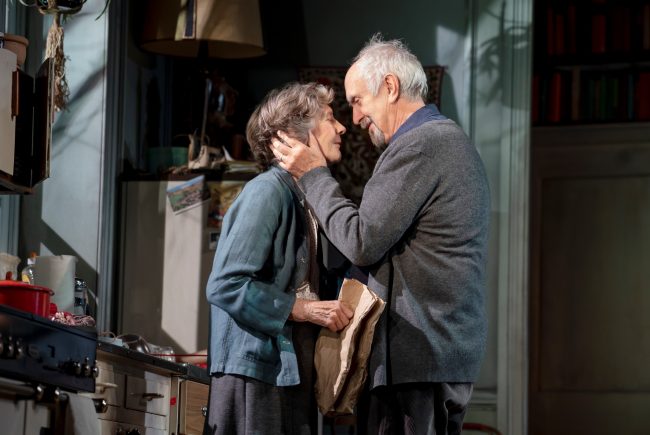
The Height of the Storm by Florian Zeller. Manhattan Theatre Club production at the Samuel Friedman Theatre, 261 W. 47th Street, New York.
The essence of this play is ambiguity and uncertainty. This bothered the critic for the New York Times. But if you need an easy, specific explication you’ve come to the wrong place.
“There must be some sense to all this!” the leading man says at one point; “Isn’t there?” And that doubt is the whole point. He refers to all of life, not just to his situation.
The incertitude of The Height of the Storm will touch audience members. Especially those of us who are aging or know people who are aging.
This drama by French playwright Florian Zeller was translated into English by Christopher Hampton and was chosen as best play of 2018 by The Guardian in London.
Jonathan Pryce gives a spectacular performance as André, a renowned man of letters who has just returned to his home from the funeral of his wife of fifty years. He trembles and stares out the window to his garden. André was once famous as a writer but now seems to be friendless and ignored. He has lapses of memory and we don’t know if he’s bereft because of his wife’s death, or senile.
I first enjoyed the work of the Welsh actor (now 72) when he created the leading role of the Engineer in Miss Saigon in 1991, and he recently impressed as the husband of Glenn Close in the film The Wife.
Eileen Atkins is masterful as the wife, Madeleine, who suddenly appears in the kitchen, bringing mushrooms to cook him an omelette. Are we to believe that she’s alive? Is it André who has actually died? Or is he alive and she the continuing presence in his mind? “You think people are dead, but that’s not always the case,” says André.
Elder daughter Anne (Amanda Drew) is there to watch over her father. Some audience members will view Anne as a dutiful and caring person; others will see her as controlling. She has arranged for a real estate agent to look at the house, and she speaks of finding “other solutions” for her father while he prefers to be left alone. He craves his autonomy. His younger daughter, the self-absorbed Elise (Lisa O’Hare) arrives later, then wanders out of the room to take a personal phone call.
The adult daughters ponder what to “do” about their parents; how to handle André’s unpublished manuscripts; how to dispose of his many books. I strongly identify with those problems.
He is struggling to comprehend. “What is my position?” he cries angrily.
His children converse as if he’s not present, even though he’s standing right there. Other critics have said this indicates that he might be dead, but I have a different idea. It’s not an either/or choice. The truth might be the tendency of people to ignore those who seem hard of hearing, or infirm, or merely old. The young often dismiss their elders as if they’re invisible.
The play reveals, slowly, that André and Madeleine’s marriage may not have been as perfect as they thought. An “old friend” (Lucy Cohu) pays a condolence call and reminisces about a long-ago affair she had with André’s best friend. André seems not to remember him or her. She talks about an illegitimate son. André’s, perhaps? Her story is as elusive as everything else. Why would a woman visit a house of mourning and start talking about her sexual history? Is she there to settle an old score?
The complex exploration reveals a once-powerful man, now pitiful, bereft and baffled. In sum, The Height of the Storm is a drama about love and loss and ways of handling the absence of one’s closest companion. It wistfully reminds us that life has loose ends that never will be resolved.
Jonathan Kent directs superbly, as he did in London. The stunning, high-ceiling set by Anthony Ward is hauntingly lit by Hugh Vanstone. The play’s three scenes last a total of only 80 minutes, which feels packed with content.